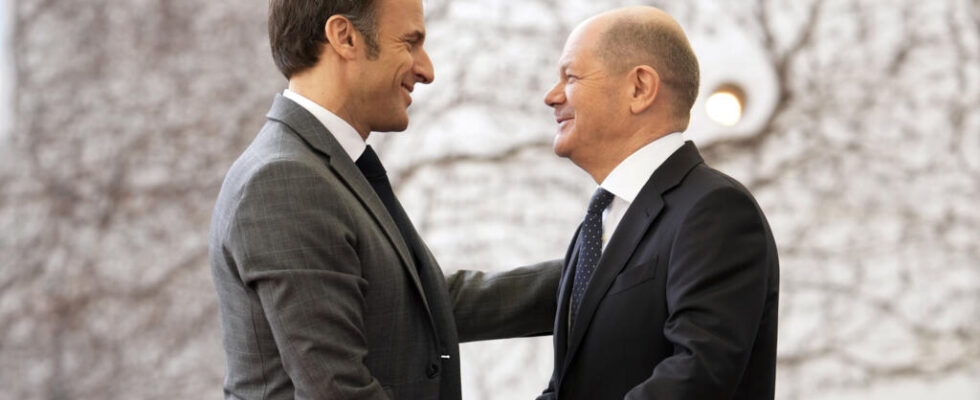Emmanuel Macron begins a three-day state visit to Germany this Sunday, the first by a French president to this country in 24 years. A trip which comes before the European elections, but also while Paris and Berlin are displaying differences on several issues.
3 mins
“ A most platonic love », headlines the magazine Der Spiegel about the relationship between Emmanuel Macron and Olaf Scholz, illustrating the ambient feeling in Germany. For the weekly, the French president will engage in a charm offensive during his state visit, reports our correspondent in Berlin, Pascal Thibaut. A caricature shows his host, President Frank-Walter Steinmeier, giving him an endless hug, to show that Franco-German friendship cannot be reduced to words.
There is no doubt that the European elections will be the backdrop of this visit, the objective of which is in particular to recall that the Franco-German couple remains the driving force of Europe, despite vicissitudes, reports our special correspondent in Berlin, Valérie Gas. “ There are points of convergence, notably working together to reindustrialise Europe, with a number of projects on artificial intelligence, biotechnology, cloud computing, also issues relating to trade defense », Lists researcher Marie Krpata. But this convergence has its limits, she tempers. “ Germany is very exposed to the Chinese market. So if ever, following the European Commission’s investigation into Chinese electric vehicles and China’s dumping and subsidy practices, customs duties were put in place against Chinese producers, Germany fears retaliatory measures from China. It is much more cautious about these investigations set up by the European Commission than is France. »
Security and defense on the menu
Europe will be on the agenda for discussions with President Frank-Walter Steinmeier and Chancellor Olaf Scholz, the challenge being to define a strategic agenda and priorities for the post-election period that the two countries can pursue together. This particularly in terms of security, defense, research, innovation and investments. The Élysée says it wants to find “ concrete variations » to Emmanuel Macron’s Sorbonne speech, to which Olaf Scholz reacted positively.
“ Emmanuel Macron will be awarded the Westphalia Prize for his European commitment, points out researcher Marie Krpata. The Peace of Westphalia ended the Thirty Years’ War [en 1648, NDLR]. These are, in a way, the bases of the international system, of sovereignty, of territorial integrity. This echoes the situation we are currently experiencing in Europe: the war in Ukraine, the violation of Ukraine’s sovereignty and territorial integrity by Russia. We will have to think about how to restore security in Europe, how to work together on issues relating to security and defense, and how to work together on the architecture of European security. » According to the daily Tagesspiegelthe issue must be on the agenda of the joint Council of Ministers on Tuesday.
The same day, Emmanuel Macron will address European youth from Dresden, in the former GDR, land of conquest of the far right, where he will once again be keen to warn against the temptation of extremes. This visit aims to give the image of a dynamic Europe with a project. This in contrast to the nationalists on the rise in Europe and France. Because the European elections are looking bad for the majority of the French president: in the polls, the gap with the far right of the National Rally is not narrowing. On the other side of the Rhine, the AfD is only credited with 15 to 17% of voting intentions on June 9, far from the 23% anticipated at the end of 2023, even if it remains promised to make good progress compared to in the 2019 election where he garnered 11%.
Read alsoEuropean elections: the future of the EU in question?
French ecology versus Energiewende: energy and climate strategy is one of the biggest disputes between Paris and Berlin
Among the many disputes between France and Germany, energy strategy occupies an important place and has even been at the origin of European paralysis on the subject of green energies. The differences between the two countries are numerous, to the point that we now consider the Franco-German couple as “ flu »: two camps have formed within the European Union.
French ecology against Energiewende: energy transition plans could not be more different between the two banks of the Rhine. Paris is banking on its carbon-free nuclear electricity, when Berlin has left it and is counting on a massive deployment of renewable energies, using gas as a transition energy to abandon coal.
These two models divide Europe. The French route led to a “ nuclear alliance “, which includes the Netherlands, Poland, Hungary and others. This while Spain, Austria and even Portugal and Ireland have joined the group of “ friends of renewables ” of Germany.
These two coalitions have been torn apart in recent years on almost all subjects of the energy transition. At the center of the question, nuclear power and its consideration or not as a green energy on a European scale: after months of battle, France won its casebut provided that the gas, on which Germany depends, be treated in the same way.
A very rare compromise, as the opposition between the two countries prevents us from emerging from the current paralysis on several European transition policies.
